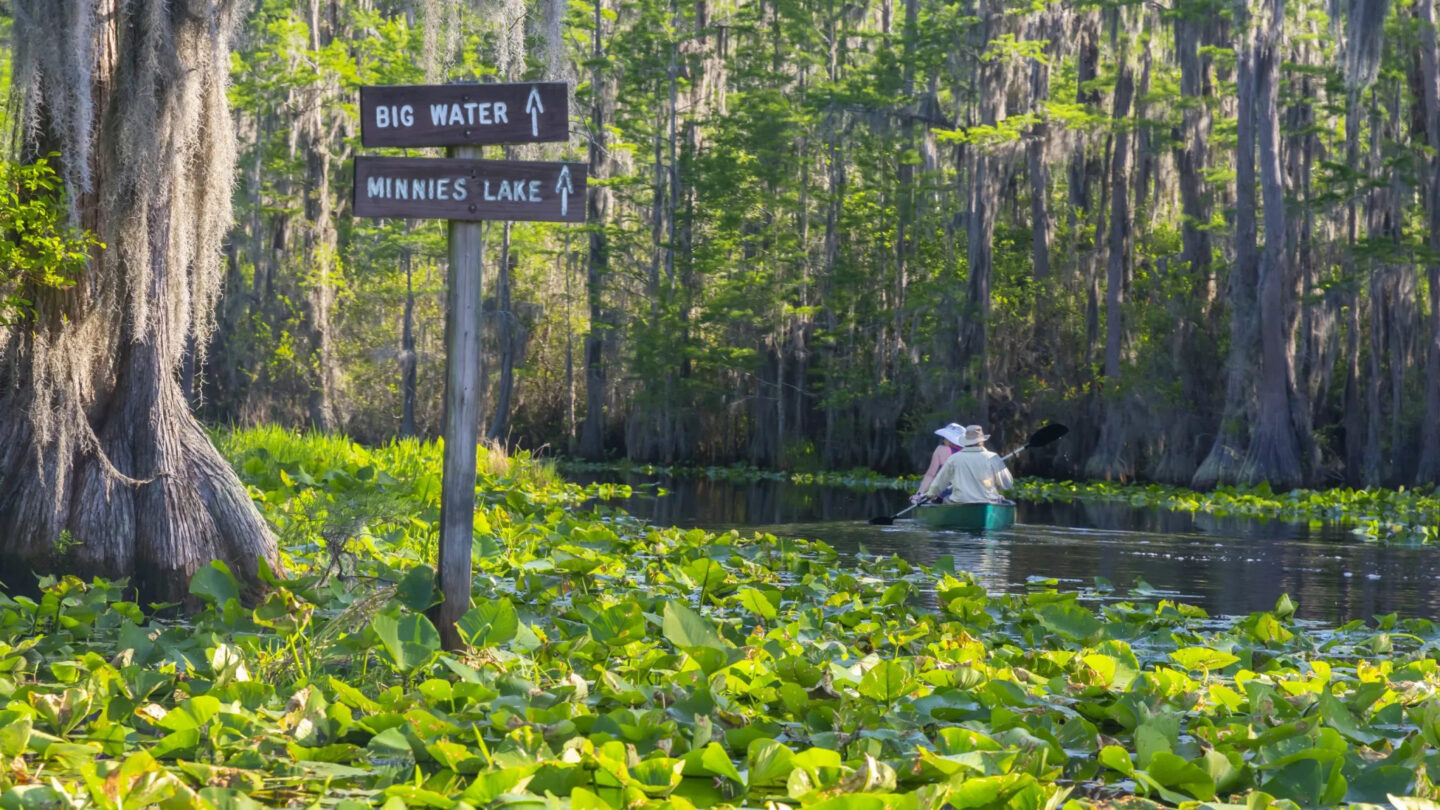This story was provided by WABE content partner The Current.
A bipartisan group of Georgia’s state and federal lawmakers are pressing regulators to protect the largest wildlife refuge in the Eastern United States from mining after the proposed Okefenokee Protection Act failed to gain traction with the Georgia General Assembly.
On the state level, Rep. Ron Stephens, Republican from Savannah, wrote a letter Thursday to the head of the Environmental Protection Division, the agency charged with protecting Georgia’s air, land and water. The sharply worded correspondence questioned a lack of transparency in evaluating mining permits sought by Alabama-based Twin Pines Minerals and underscored growing scientific concern about possible extraction activity in the parcel of land the company has targeted some 3 miles from the protected swamp.
“(T)here are many unanswered questions, including the background and safety record of the mining company that is applying for the permit,” Stephens told EPD Director Rick Dunn. “In addition, there have been numerous public requests and a letter written by over 43 scientists from across Georgia suggesting that mining on Trail Ridge threatens to damage the Okefenokee, lowering the swamp’s water level.”
Stephens’ concern echoed the message to the EPD by the sponsor of the defunct Okefenokee Protection Act. Rep. Darlene Taylor, a Republican from Thomasville, wrote Dunn on March 1 urging him deny permits to the company, which wants to mine titanium ores near the Okefenokee National Wildlife Refuge.
Both Stephens and Taylor base their skepticism about the mining plans on a scathing memo from UGA hydrologist Rhett Jackson that critiques company’s modeling of its mining impacts. The scientist detailed eight “issues” in the company’s modeling reports as well as in other parts of the surface mining and groundwater withdrawal permit applications.
So far, the EPD has not answered the lawmakers’ concerns.
“There has been no EPD response to the letter other than forwarding to the permit review group,” EPD Spokesman Kevin Chambers told The Current.
Twin Pines is waiting for the EPD to decide on five permits, with some applications filed back in December 2019. Its mining permit application was filed in November, 2020.
“The applications are still under review,” Chambers wrote. “The permitting fact sheet at https://epd.georgia.gov/twin-pines explains the process. The next step is completion of a mining land use plan. When the applicant completes it, EPD will place the plan out for public comment. A draft permit will not be issued until the (mining land use plan) is approved.”
This lengthy review process was the reason that legislators gave for stalling the Okefenokee Protection Act. The bill aimed to protect the area known as Trail Ridge, which forms a natural dam to the east of the swamp, by preventing the EPD from issuing any mining permits and it initially had bipartisan support from powerful committee chairs.
Language in the bill limited it to “future permit applications,” not the ongoing application from Twin Pines. However, Rep. Lynn Smith, (R-Newnan) chairman of the Natural Resources & Environment Committee, told Capitol Beat the bill was premature because the EPD was still reviewing the company’s permit applications and had yet to open a 60-day public comment period.
Twin Pines President Steve Ingle dismissed the scientific concerns cited by lawmakers Stephens and Taylor as “speculation.”
“Such efforts have not impacted our plans and we are moving forward, doing what the EPD tells us to do, responding to their requests and trusting the process,” Ingle said in an emailed statement. “Opponents can say whatever they want to say without having to prove their point. We don’t have that luxury, nor do we want it. We know the EPD will make an informed and fair decision on our permit applications based on the facts, not speculation.”
Federal efforts
On the federal level, U.S. Sen. Jon Ossoff is working to amplify the anti-mining message of the Georgia Republicans by urging both the U.S. Environmental Protection Agency and the Army Corps of Engineers to reinsert themselves into the permitting process.
His argument to both agencies revolves around the changing criteria for which wetlands fall under the jurisdiction of the U.S. Army Corps. The Obama Administration in 2015 slightly expanded the scope of what the Corps and other federal agencies must protect. In 2020, the Trump Administration narrowed that scope. Now the Biden Administration is in the process of restoring the pre-2015 regulations.
Leopoldo Miranda-Castro, regional director for the U.S. Fish & Wildlife Service in the South Atlantic-Gulf and Mississippi Basin Regions, which manages the Okefenokee National Wildlife Refuge, has made similar requests to the U.S. EPA and the Army Corps of Engineers in letters dated Dec. 21, 2021, just a day after Ossoff’s letters.
As Miranda-Castro notes, the Corps originally evaluated the Twin Pines project under the pre-2015 rules and determined it would impact 587 wetland acres (approximately 46% of the area to be mine in that proposal). Twin Pines requested and received a new jurisdictional determination of fewer acres under the 2020 rule. Then the company modified its project footprint to avoid the remaining jurisdictional wetlands altogether and no longer needed permits from the corps.
“Due to the unique and irreplaceable nature of the Okefenokee National Wildlife Refuge, its significance to Georgia and the Nation, and recent federal court rulings invalidating the Navigable Waters Protection Rule, I urge the EPA to exercise its special cases authority to revoke the October 2020 jurisdictional determination,” Ossoff wrote to the EPA in December. “By bringing this project back within federal review, the EPA will ensure that the Okefenokee Refuge receives the protection it deserves.”
EPA Assistant Administrator Radhika Fox responded to Ossoff on Feb. 16, saying the agency couldn’t use its special case authority in this situation but that the Corps might provide a solution.
“The EPA’s letter demonstrates that paths to saving the swamp remain open,” said Ossoff spokesman Jake Best. “For example, the Army Corps may revise its prior determination on the basis of new information.”
The Corps sent a “very initial reply” that has become outdated in the time Ossoff and his team have worked with them on the issue, Best said.









